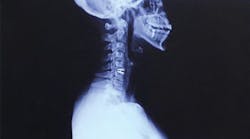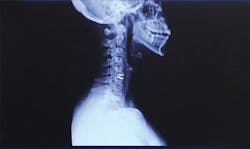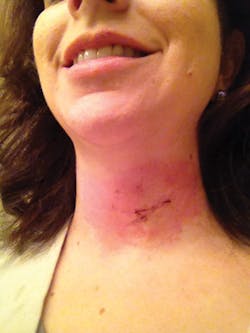Advocate for yourself, do everything in your power to prevent cumulative trauma to your body, and always be prepared for situations over which you have no control. You have the ability to help shape your future.
Christa Crilley McConaghy, BS, RDH, PHDHP
“Mommy, why are you so mean?” These words were spoken by a child to her mother when she arrived at home from her 11-hour workday in the dental office. When Mom had left the office that day, she didn’t leave her mental and physical stress in the operatory. It had traveled home with her.
She had spent the day hovering over patients while perched upon a rickety operator stool with one half-hour break in the middle of the day. She was overbooked and overworked. Her body and mind had been used and abused by her own doing, and she was completely drained.
Years of neglect and denial had created physical and emotional wounds. She thought she hid them well, but they came to the surface that day. The pains she thought only she had felt had impacted her family and had broken the heart of her young daughter. Her strained neck, which she acquired from working in pediatrics early in her career, had progressed to sharp
electric-shock pains traveling down her arm 12 years later.
Throughout her career, she had contorted her body into different positions to ensure that her patients would be comfortable. She even complied with the demands of a toddler patient’s parent that she “figure out a way to see into [her] child’s mouth even if [she wanted] to sit on a bicycle.” She was not a contortionist, but she tried to be for the comfort of her patients.
A herniated disk was the cause of years of pain resulting from improper workplace ergonomics
After being questioned by her daughter, she finally took some time off from work. She was back at it again, a week later, hovering over patients in her habitual traumatic position. The daily discomfort was something she accepted as her new normal.
There had been numerous visits to specialists with inconclusive diagnoses. The pain came and went like clockwork every three to four months. It would begin with tightness radiating from the base of her neck, creating stiffness, and then the pain would cause so much discomfort that she would be unable to rotate her head to the side. She might not be able to turn her head to the right, but she could still work. The show must go on!
Her posture improved after purchasing loupes, but she found that it wasn’t enough. The investment in a saddle stool helped her dramatically, but the damage had already been done. Finally, her fingers on her dominant hand went numb. The permanent loss of feeling is a sure career death sentence for a clinician, so she feverishly began searching for answers. The threat of losing her career finally had her searching for the root cause.
We hear similar stories of pain from hundreds of dental hygienists throughout our careers. None of us began dental hygiene thinking that the profession would hurt us. We chose the helping profession to do just that—help others.
This particular story is mine. I never thought that the physical toll I put on my body would limit my ability to perform my job effectively, and that a subsequent medical condition would jeopardize my financial future.
While it did take some time, a neurologist finally confirmed that a herniated disk in my neck was the cause of my pain. I was initially prescribed one month of physical therapy, which eventually turned into three. The co-pays and the unpaid sick time I needed to take away from the office added up to approximately $5,000. Unfortunately, physical therapy was only a short-term fix, and the herniated disk continued to wreak havoc on my life.
Seeing the scar on my neck, resulting from the subsequent cervical disk replacement surgery, patients were more willing to lie back farther and turn toward me when I asked. I frequently ask myself if surgery could have been avoided if I had advocated for myself and required my patients to accommodate me. If I had invested in my loupes and my saddle stool earlier, could that have helped?
In a series of studies that were conducted to measure the prevalence of musculoskeletal disorders of dental professionals, dental hygienists have reported that 54% to 83% have experienced neck problems and 35% to 76% have experienced shoulder issues in the preceding year. Repetitive motion and improper ergonomics were to blame for their upper extremity musculoskeletal disorders.1 Lost income to the clinician and revenue to the dental practice has also been noted due to absenteeism, which can also impact career longevity.2
What if we subtract our posture from the equation? What else contributes to pain in our profession? How about an improperly designed dental operatory? Do you need to squat and reach for items you use every day? How about the maintenance of our equipment and instruments? Are your instruments constantly sharp, requiring fewer repetitive motions to flick off that piece of calculus? How about the 10- to 12-hour days, mental stress, and fatigue? We have the potential to burn out our bodies and minds at a very quick pace with all of these variables.
A scar on the author’s neck from cervical disk replacement surgery
Creating an exceptional hygiene visit does not give us permission to neglect our own health in order to accommodate a patient who is allergic to the supine position. Putting necessary equipment—our bodies—into traumatic positions is not advocating for ourselves. What happens when a piece of our machine malfunctions? What happens when we can no longer work? How do we protect ourselves financially?
The financial impact of a disability can be devastating. This is why having disability insurance is so important. A musculoskeletal disorder or other unforeseen issue may prohibit us from working within our profession or limit the amount of time we perform clinically. The inability to work in our profession requires a specific clause added onto a disability policy called “Own Occupation.” This means that you cannot perform the duties to which you are educated. This is a clause in a plan that should be required for those of us who use our bodies as a piece of the equipment.
Whether you get the policy through your employer or get it for yourself, it is a safety net to help you through the financial rough patch in case the unexpected happens. Read your policy and make sure that the “Own Occupation” clause is included. Like dental insurance, every disability policy is different. Some may have limitations on how long you can collect and what percentage of your salary you can receive.
The key is to prevent, and as dental hygienists we are prevention specialists. What can we do today to work toward preventing musculoskeletal disorders?
• Have posture buddies. Periodically have a colleague watch and remind you to realign yourself. Each of you can take turns being the patient in the chair or the operator and have a third person in the office take pictures of what you look like while working. You’ll be surprised by what you see.
• Invest in your health by purchasing loupes and a chair to fit your body type. Try different types and different manufacturers. Since no one’s body is the same, what works for you may not work for a colleague in the same office.
• Ask your patients to adjust themselves to you. They will expect you to adjust to them if you don’t ask.
• Balance your schedule. Vary your procedures to avoid straining and repetitive motions. This requires communicating with the entire staff. Remind the team that scheduling effectively will decrease the rescheduling they will need to do if you are absent due to pain.
• Stretch. Use those precious seconds you have between patients to move your body using stretches.
• Make sure your operatory and instruments are user-friendly. Move equipment around to accommodate you. Purchase new equipment when old equipment has served past its lifetime. Sharpen those instruments!
While we try to prevent these conditions from happening in the first place, sometimes a medical problem is unavoidable. We never know when life will throw something unexpected our way.
Gone are the days when I came home and snapped at my family because of the pain. While I am educated in oral health promotion and dental hygiene and can perform many jobs outside the operatory, my situation has changed. The clinical career I had hoped for did not work out according to plan. Early on, I had the foresight to know something could jeopardize what I did for a living and that I needed to be prepared. The disability plan that I invested in became the safety net I required for my family and myself.
My takeaway is this: advocate for yourself, do everything in your power to prevent cumulative trauma to your body, and always be prepared for the situations over which you have no control. You have the ability to help shape your future.
References
1. Morse T, Bruneau H, Dussetschleger J. Musculoskeletal disorders of the neck and shoulders in the dental professions. Work. 2010;35(4):419-429. https://content.iospress.com/articles/work/wor00979. Published January 1, 2010. Accessed October 11, 2018. doi:10.3233/WOR-2010-0979.
2. Liskiewicz ST, Kerschbaum WE. Cumulative trauma disorders: an ergonomic approach for prevention. J Dent Hyg. 1997;71(4):162-167.
Christa Crilley McConaghy, BS, RDH, PHDHP, has been a dental hygienist for more than 20 years and received her bachelor’s degree in oral health-care promotion from O’Hehir University in 2013. She is currently a trainer for Perio Protect and a presenter for the Healthy Teeth Healthy Children program, a medical/dental partnership that works to increase dental access to children. Her career goals are to improve oral health care by implementing disease prevention programs into offices, and to help hygienists and dentists realize the potential impact their dental hygiene departments have on their practices and their patients’ systemic health.









